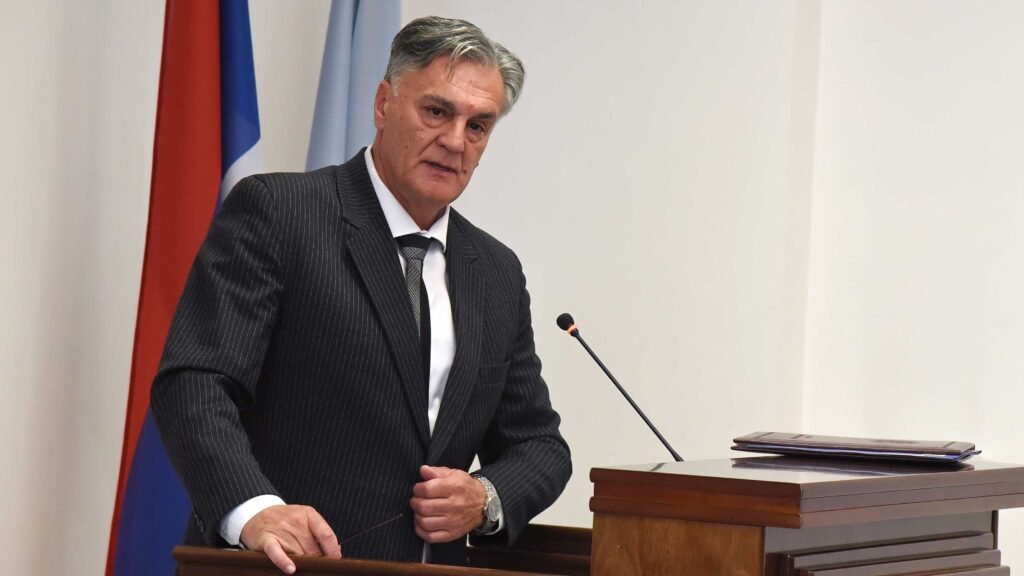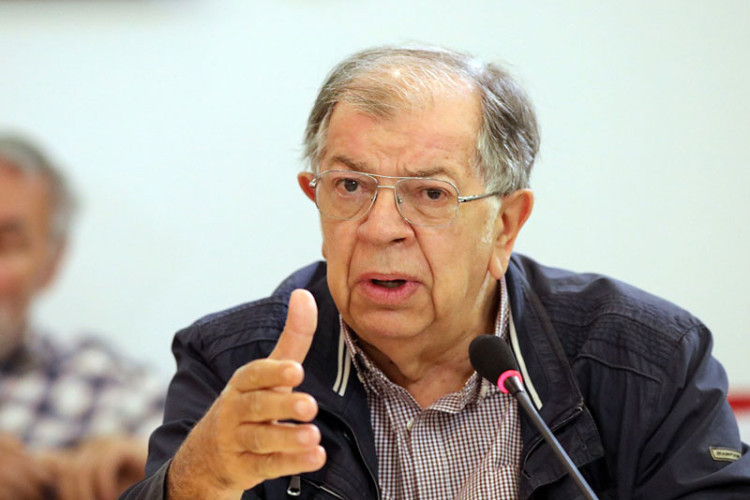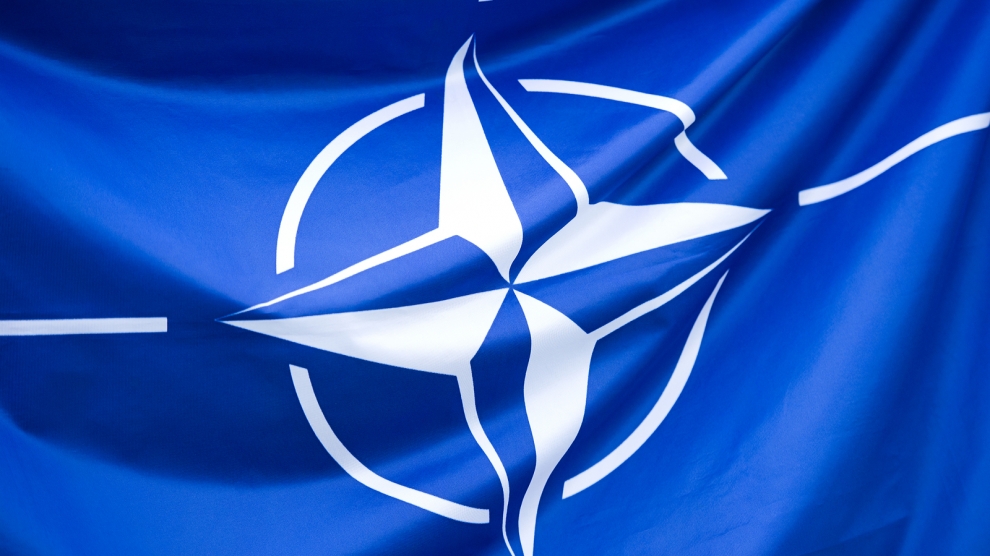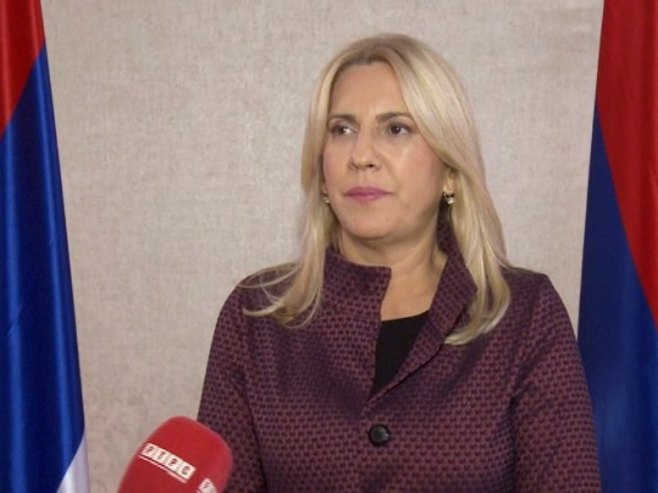Constitutional law professor Siniša Karan emphasized that the fundamental principle of democratic constitutional order is that power originates from the people, and that the will of the people represents the highest source of legitimacy for any government.
The Constitution of BiH, in its preamble, recognizes that power originates from the constituent peoples and other citizens. Constitutional theory speaks of the people as the holder of sovereignty, meaning that power is not granted by international representatives, from outside, or from above, but rather by the people through democratic elections and institutions,” noted Professor Karan in his article for Srna, which we are publishing in full:
(CON)STITUTIONALITY OF THE PROCESS IN BIH
Understanding the concept of the state, its elements, and constitutionality as the foundation of the legal order is essential for analyzing the right to a referendum and the principle of popular sovereignty within the constitutional order of BiH and its entities.
In order to assess the constitutionality of political and legal processes in BiH, one must start with the basics, from the concept of the state, its constitutive elements, and the nature of power in democratic societies.
- What is a state and what are its elements?
A state, in the classical legal and political sense, is a community of people in a specific territory under sovereign authority. According to the classical definition of Georg Jellinek, a state has three key elements: territory, population, and power, which Jellinek calls the state’s triad.
Jellinek states: “A state is a legal person consisting of a permanent community of people, residing in a specific territory, which has independent power.” In modern constitutional theory, independent and constitutionally limited power, along with the will of the people as the source of legitimacy, living on a particular territory, represent the foundation of statehood. Without this framework, it is impossible to speak of a legally organized political community.
- Republika Srpska as a state-legal entity
Republika Srpska was created as an expression of the will of the Serb people in BiH to protect their political, legal, and national identity. Its existence is founded on the decisions of the Assembly of the Serb people in BiH from 1991 and was internationally recognized by the Dayton Peace Agreement in 1995. The Constitution of BiH (Annex IV of the Dayton Agreement) states: “Bosnia and Herzegovina consists of two entities: the Federation of Bosnia and Herzegovina and Republika Srpska.” (Constitution of BiH, Article I/1)
Republika Srpska, as one of the two entities that make up BiH, has its own territory, population, and government, including legislative, executive, and judicial powers, all of which are elements of statehood in line with Jellinek’s widely accepted definition of a state.
In this sense, Republika Srpska possesses the essence of statehood, even though it does not have full international legal subjectivity.
- The endangerment of the statehood of Republika Srpska
The constitutional position of Republika Srpska has been continuously weakened by foreign factors and institutions that lack democratic legitimacy. The systematic stripping of powers from Republika Srpska is carried out through unconstitutional actions of the BiH Parliamentary Assembly, the BiH Constitutional Court, and high representatives, who arrogate powers they do not have under the BiH Constitution.
It is well-known that the BiH Constitution does not contain any provision granting the high representative the right to enact laws. Moreover, the BiH Constitution does not mention the high representative anywhere, which means that the high representative is not a constitutional category and does not have constitutional powers.
Clearly, constitutionality is everything that has its basis in the constitutional text, and unconstitutionality is precisely the absence of that basis.
Carl Schmitt, one of the most significant constitutional thinkers of the 20th century, explained: “The sovereign is the one who decides on the state of exception.” In this context, sovereignty belongs to the people and their democratically elected institutions, not to a foreign factor placed above the constitutional order.
Sovereignty cannot be transferred or suspended without suspending the Constitution itself. Therefore, in cases of the takeover of constitutional powers, the high representative suspends the BiH Constitution and the constitutions of the entities.
- What does constitutional or unconstitutional mean?
The legal order is based on a hierarchy of legal acts. The Constitution is at the top of this hierarchy. Every legal act, in order to be valid, must be in accordance with the Constitution. If any decision, law, or other act has no basis in the constitutional text, it is unconstitutional. The constitutional basis must be explicitly stated, quoted from the Constitution itself.
Unconstitutionality is not a matter of political disagreement, but a legal assessment of whether or not there is constitutional authorization. The BiH Constitution does not recognize the institution of the high representative as a holder of legislative power or any other power, although high representatives have often arrogated all three powers to themselves.
In this regard, any decision by the high representative to enact or change a legal act at the BiH level is absolutely unconstitutional, because it was not enacted by the authorized body – the Parliamentary Assembly.
The Constitution defines who the legislator is. Simply put, even a local community council has no fewer rights than the high representative when it comes to legislation.
- The will of the people as the foundation of sovereignty
The fundamental principle of democratic constitutional order is that power originates from the people. The will of the people represents the highest source of legitimacy for any government. The BiH Constitution recognizes in its preamble that power originates from the constituent peoples and other citizens.
Constitutional theory speaks of the people as the holder of sovereignty, meaning that power is not granted by international representatives, from outside, or from above, but rather by the people through democratic elections and institutions. Jean-Jacques Rousseau emphasized: “Sovereignty belongs to the people and cannot be alienated.”
In BiH, according to the Dayton Constitution, sovereignty is shared between the two entities and three constituent peoples. Thus, the will of the Serb people in Republika Srpska is not subordinated to the will of international officials.
A referendum, as a direct expression of the people’s will, is the supreme democratic mechanism through which sovereignty is expressed.
Each people shapes and organizes its own social reality. Each people has its own style and way of living and its own model of social order.
From these particular social circumstances comes the normative framework, headed by the Constitution. For this reason, every constitution in the world is unique. The BiH Constitution is special due to its diversity and compromise.
All three peoples signed the Dayton Constitution because it established consociational democracy and guaranteed the rights of the constituent peoples and entities through the establishment of various protection mechanisms.
However, the peoples did not sign the acts of the high representatives, nor did they at any point consent to foreign factors derogating the constitutional order and changing the Constitution with their decrees in an unconstitutional manner.
The reasons and social circumstances that led to the signing of the Dayton Agreement are still valid today. Nothing has changed. Therefore, the only correct course of action is to apply the Dayton Agreement in its original form.
In the case of the degradation of the Dayton Agreement, which we have witnessed for decades, the peoples as holders of sovereignty are obligated to protect this agreement through democratic expression of will. The best way to do this is through a referendum.
The Serb people expressed their own state-building will as early as the Declaration of the Assembly of the Serb People in BiH from October 24, 1991, in which it states:
“The Serb people are a historically and state-building people and are equal to all such peoples. The Serb people have a long tradition of democracy, they respect and value the peculiarities and interests of other peoples and states, but they ask that others respect the interests and peculiarities of the Serb people and the state in which they live.”
THE REFERENDUM – THE GREATEST DEMOCRATIC ACHIEVEMENT
A referendum, as one of the forms of direct democracy, plays a significant role in the democratic organization of political communities and organizations. Republika Srpska has the legal basis, but also the experience, in conducting referenda, which is the greatest democratic achievement of the citizens and the people.
Republika Srpska can use this method to decide on all important issues. Citizens can express their opinion in a referendum about whether they support or oppose any processes related to Republika Srpska.
The Constitution of Republika Srpska provides for legislative activity and the right of the National Assembly of Republika Srpska to conduct a republic-wide referendum. The decision of the people in the referendum does not endanger the integrity of BiH, but rather enhances the democratic order.
The Dayton Peace Agreement does not contain any provision that could be interpreted as a ban or restriction on a referendum. Therefore, holding a referendum is in accordance with the BiH Constitution, especially with the practices of democratic countries in Europe and the world.
The Constitution of Republika Srpska defines the referendum in Articles 70 and 77, and it is specifically elaborated in the Law on Referendum and Citizens’ Initiative of Republika Srpska, which has passed constitutional review.
The Law on Referendum and Citizens’ Initiative underwent a constitutional review by the Constitutional Court of Republika Srpska and became valid. A referendum is a form of direct and free expression of citizens, and no one can hold a citizen accountable for their expression in a referendum held based on the Law on Referendum and Citizens’ Initiative of Republika Srpska.
Therefore, there is no legal argument for not holding a referendum.
THE HISTORY OF REFERENDA IN REPUBLIKA SRPSKA
It is important to remind that there is a history of holding referenda in our region:
- The Assembly of the Serb People in BiH, based on the then valid, Constitutionally established right to self-determination, including the right to secede, at its session on October 24, 1991, adopted the Decision to call and conduct a plebiscite of the Serb people in BiH to confirm the Decision of the Assembly of the Serb People in BiH to remain in a common state of Yugoslavia, with Serbia, Montenegro, SAO Krajina, SAO Slavonia, Baranja, and Western Srem, and others who agree with this.
- The March referendum, which determined the status after the breakup of the SR BiH, was held without the participation of the Serb people.
- The Decision of the National Assembly not to accept the Vance-Owen plan was confirmed by the people in a referendum held from May 15 to May 17, 1993. In the same referendum, citizens confirmed their support for the second referendum question – for an independent Republika Srpska, with the right to enter into equal relations with other peoples and states.
- The National Assembly rejected the plan for territorial demarcation in BiH proposed by the International Contact Group despite immense pressure from the international community and Serbia. The people of Republika Srpska also rejected this plan in a referendum held on August 27 and 28, 1994. This referendum, like the first, clearly demonstrated the high level of unity of the Serb people and their commitment to the policy pursued by the state leadership of Republika Srpska and their determination to defend their freedom, sovereignty, and equality.
- The National Assembly of Republika Srpska, on July 15, 2016, adopted the Decision to call a republic-wide referendum on the territory of Republika Srpska, with the referendum question: “Do you support celebrating January 9 as the Day of Republika Srpska?”
The republic-wide referendum was successfully held on September 25, 2016, and the National Assembly of Republika Srpska, in its Decision on the results of the republic-wide referendum, noted that the referendum question received the support of the citizens and that the result of the referendum was valid.
RESISTANCE TO THE OCCUPIER THROUGH THE VOICE OF THE PEOPLE
The principles on which the three warring sides agreed to live together are also guarantees that each people will be able to continue its existence in freedom, equality, and the emancipation of its cultural, ethical, linguistic, spiritual, religious, and historical values.
The guarantee for their participation in state power is through parity with other peoples and through consensus as a decision-making method that prevents any over-voting and majoritization.
However, the imposed Bonn powers (from 1997) have allowed the high representative to become the most important legislator in BiH, shaping its state organization.
By enacting new laws and amending existing ones, the high representatives have significantly changed the constitutionally established principles of the division of powers. Through the transfer of powers from the entities to BiH institutions, entities have gradually lost their original competencies in favor of BiH institutions.
Thus, acting as a constitutional and legislative power, the high representatives have revised the BiH Constitution, disrupting the constitutionally defined balance between the entities and BiH with the clear goal – the unitarization of BiH.
It is very important to emphasize that the high representative is a Dayton category but not a constitutional one. The high representative is not mentioned in the BiH Constitution, but in Annex 10, making it clear that the high representative has no constitutional powers.
The most striking example of legal violence against Republika Srpska by the occupier is the judgment of the BiH Court for the crime of “non-implementation of the high representative’s decisions” and the subsequent actions of the Central Election Commission of BiH towards the President of Republika Srpska, Milorad Dodik.
The aim of this unprecedented legal farce in the civilized world is to eliminate the democratically and popularly elected president of Republika Srpska from political life.
The entire process has been staged and prepared for years by the illegal and illegitimate Christian Schmidt, who has prepared it for an attack on the will of the people and the institution of the head of state – the president of Republika Srpska, through the imposition of changes to the Criminal and Electoral Laws.
Supported by the decisions of the BiH Constitutional Court, Schmidt has continuously tried to undermine the will of the people of Republika Srpska and create a practice where decisions by Republika Srpska’s institutions are rendered ineffective, while key elements of its statehood are simultaneously undermined.
Therefore, the process of erasing the elements of statehood of Republika Srpska through an attack on the institution of the president of Republika Srpska by the occupiers of BiH, aiming to create a unitary Muslim state in the heart of Europe, is at its peak, and this attack has created the constitutional and political foundation for calling a referendum in Republika Srpska.
For this reason, it is necessary to return the right to decide to the only real sovereigns in Republika Srpska – its citizens and peoples! The coup against Republika Srpska forces its institutions to call the citizens of Republika Srpska to a direct vote through a referendum, thereby offering resistance to the occupiers and unequivocally saying “NO” to colonial rule.
THE WILL OF THE PEOPLE AS THE ONLY SOVEREIGN
The freely expressed will of the people defines the social conditions, and those conditions define the constitutional order. Therefore, Republika Srpska is obligated to seek the people’s stance on a decisive, defensive, and crucial referendum for the Serb people!
The Serb people have one final chance to defend Dayton’s BiH and Dayton’s Republika Srpska. The institution of the President of Republika Srpska is the expression of the people’s will, and the people must decide whether they approve of the annulment of their will by an unelected foreigner, or whether the people of Republika Srpska retain the right to freely and democratically express their sovereign will in the future.
When we mention the reasons for a referendum, we must not overlook the previously adopted legal and political acts of the National Assembly of Republika Srpska, which show that there is a constitutional and legal basis, as well as political justification, for holding a republic-wide referendum.
The overstepping of competencies, illegal and illegitimate actions, the establishment of colonial rule, and the attempt to introduce the institution of the “high representative” into the constitutional system of BiH can (and must) only be stopped through the voice and decision of the people. The institutions of Republika Srpska are obligated to ensure that the people have the final say!
Resisting changes, degradation, and distortion of the Constitution of Republika Srpska, the Constitution of BiH, and the entire Dayton Agreement is our duty, not only for future generations but also for those who gave the greatest sacrifice so that we could today enjoy the privilege of living in a free Republika Srpska. We are forever indebted to them.
Soure: RTRS









